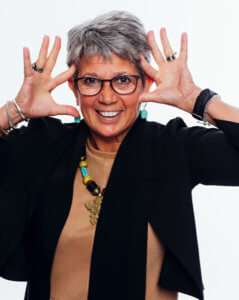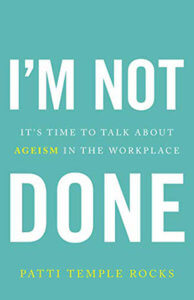
Patti Temple Rocks wrote her book, I’m Not Done: It’s Time to Talk About Ageism in the Workplace, after she felt she was being marginalized at her workplace. (Dimosthenis Christopoulos)
About a decade ago, Patti Temple Rocks noticed that her boss at the company where she worked — the first woman to make her way to the executive wing at the top of this Fortune 50 company — was no longer being invited to meetings she should have been participating in at the office. There were other telltale signs that she was being marginalized, but from what Temple Rocks could see, her boss, mentor, and friend was performing as highly as ever.
So Temple Rocks approached the company’s CEO at an office party to see what was going on. Her boss had been doing her job for a very long time, he said, and he just thought she had grown “tired.” “I didn’t know enough at the time to realize that ‘tired,’” Temple Rocks told Convene, “was basically a euphemism for age.”
A communications professional with decades of experience in senior leadership roles, Temple Rocks began to pay attention after that, she said, to when colleagues took early retirement packages. “When you’re 40,” she said, “you think, ‘Oh, wouldn’t that be great? I hope I get to take early retirement.’ You don’t necessarily realize the negative implications.” Even though those repercussions started becoming more apparent to her, she said she accepted “this foregone conclusion that there would come a point in time where somebody else would decide — society, the workplace, and not me — that it was time for me to move on.”

“When you’re 40,” Patti Temple Rocks said, “you think, ‘Oh, wouldn’t that be great? I hope I get to take early retirement.’ You don’t necessarily realize the negative implications.” (IFC Next)
At that time, every book or article that Temple Rocks read on the topic of older professionals was about how to reinvent yourself for a second-act career. “That’s kind of where I let my thinking go,” she said, feeling fortunate that she had a long list of things that she would be interested in pursuing in her second act.
“But then lo and behold, the opportunity to think about my second act came at a time when I was not the least bit ready or prepared for it,” Temple Rocks said. “I was offered a role that didn’t feel like that appropriate sort of next job for me. It felt more like I was being marginalized or sort of pushed to the side. And I realized with blinding clarity, like, holy sh*t, I’m not ready for a second act. I’m still fully in the first act and I don’t want to go do something else. I’m good at what I do.”
Temple Rocks said she hadn’t asked herself why somebody else would get to make that decision for her. “That’s when it hit me,” she said, “that the problem is not that we Baby Boomers need to get ready for our second act, it’s that the workplace needs to do a better job of managing that situation with us instead of to us.”
She left her job and decided to take some time to try to figure out what to do next, while writing a blog in which she candidly talked about her situation — striking a nerve with many people in the same age group who shared how they or others in their lives had found themselves in a similar situation. “I realized that this was not a unique experience that was only happening to me and a handful of people that I knew. So I just decided to write a book about it,” Temple Rocks said. “I think the biggest problem out there is that it is not talked about openly and that’s why it’s allowed to continue and persist.”
The book, I’m Not Done: It’s Time to Talk About Ageism in the Workplace, was published last year, and Temple Rocks shared with Convene the messages she wanted to get across in the book and the conversations she hopes it will spark.
You talk in the book about ageism being the last acceptable prejudice in the workplace. How so?
One of the greatest filters I can recommend to somebody is: If you think about a situation and put it on any other protected class, would it seem okay? So let’s say that the organization is trying to save costs, which is usually what [letting people go] is about. And so let’s say it’s an Asian American woman who maybe demands a high salary. If the company was to offer some sort of a severance, but it felt like it was because of race, everyone would go, “Wait a minute, this doesn’t seem right.” Or, “Why is Suzy so-called retiring?” It would seem wrong and like something is up.
But when people take a package and society has declared that people might retire anytime in their 50s or 60s — and again, some people may want to, but for those that don’t, it doesn’t look amiss. So people don’t necessarily question it.
You cited in your book a recent Pricewaterhousecoopers CEO survey in which only 8 percent said age is part of their company’s diversity training. Why do you think age is still largely absent from diversity conversations?
If you think about age in general, we’re conditioned not to talk about it. We’re taught from an early age that it’s rude to ask somebody how old they are. You go to a Hallmark store and you can find cards that make fun of someone’s age, whereas you would never think it’s okay to buy a greeting card that makes fun of someone’s race or disability status or something like that. I just think that we, as a society, have been really slow to understand this. I also think that the sheer number of our Baby Boomer generation coming of age now is forcing some of these conversations that have been largely absent because there was no need to do so previously.
Our generation is living so much longer. If we retired when we were 55 like previous generations did, a lot of us might have 30 or 40 years left. That’s a lot of money that we have to have, but it’s also a lot of like, what are we going to do with ourselves? I think it has not been part of the
Related: Ending the ‘Last Acceptable Prejudice’
discussion because in a way, the generation that should push it is ours. I’m 59, and I’m amazed how many people even my age are afraid to talk about it for fear that it might speed up being deemed relevant or pushed out of the company.
So it’s almost like you lay low and hope that sort of nobody notices you as opposed to people being much more like, “Look at me, I’m 59 and I’m still one of your most valuable employees, I’m contributing this or that.” One of the things I found interesting in my conversations with people in their 20s and 30s at organizations, is that they are dying to seek out the wisdom of the older generation. So that is not where I am finding ageism to be rampant.
I think ageism is much more rampant, let’s be honest, with the generation right behind us who have a subconscious bias I think, and potentially just want us out of the way.
So what do you say about the argument that Boomers need to leave to make room for those Gen Xers and Millennials?
There are realistic points that need to be openly discussed about this or we will make no progress. You reach a certain level in an organization and there may not always be another up and another up and another up, you know? And so some of these moves are going to have to feel more lateral or potentially solve a different need in the organization. But that’s where the conversation needs to come — we have to talk to people about what those things might look like in order for them to feel good about them. The HR people that I talked to for the book just had the greatest sort of antidote to that awkward conversation — they said it just has to happen every year, no matter what.
Are you optimistic that just like the #MeToo movement has made our society more aware of the pervasiveness of sexual harassment, discrimination against older workers won’t be prevalent in the next few years?
Yeah, I am. I’m not sure if I could put a timeframe on it but I am optimistic — we’re a very large group of people to ignore. The other thing is that some organizations are worried about losing talent.
 When older people are let go, it’s not just the institutional knowledge that that their organization loses, it’s the relationships they’ve spent their career developing.
When older people are let go, it’s not just the institutional knowledge that that their organization loses, it’s the relationships they’ve spent their career developing.
I think that’s absolutely true. And one of the people that I quoted in my book, Susan Credle, who’s the global chief creative officer for a large ad agency, talked about that. She said, “I can figure a problem out much faster because I know who to call, and I’ve had that experience, and that person is going to take my call. There’s no shortcut for that. I can give somebody at a junior level that phone number, but they may or may not take that call because it’s just a different kind of conversation.”
I never want it to feel like I’m being against young people. There’s nothing wrong with not knowing who to call at an early stage in your career. It takes time to develop that, but that’s why the workplace is better with all of those generations.
A recent Stanford study that found that 40 percent of retirees would prefer to be working, and that 60 percent said they would accept lower pay for more flexibility than they had in their full-time position. The study also pointed out that it’s really unnatural to have such an abrupt end to your career. Does that match your research for the book?
Every single person I talked to said that they would have considered that option. And they were honest enough to say although maybe not at first. It might’ve taken me a while to wrap my mind around it, but basically if you just think about it on a purely practical level, it’s sort of what is likely to happen anyway to a lot of people — they’re going to realize that the cost of health insurance alone is enough for them to go back to work and they may not be able to find a job that’s exactly the salary and at the level they’re used to. But as I realized, maybe I don’t want to be as completely working nonstop as I was before, anyway.
Your point about it being abrupt is so true. It is that level of being unprepared for the big change that I think makes it hard for people. It literally has a physical health impact on them — it subtracts three years from their lives. So that’s the humanitarian reason to give people a little more time.
I think it’s very important that everyone understand that this affects ultimately everyone. Aging is not a choice. We’re all going to age, but ageism exists. So we can all make a commitment to be less ageist and not practice ageism in our workplaces because it’s eventually going to happen to all of us — and it’s probably already happened to someone that you love or care about and maybe they just didn’t feel comfortable even telling you about it at the time. We just have to be honest and talk about it with each other, with our bosses and in our workplaces. And CEOs and executives need to make sure that they have an explicit plan and strategy in place to address it.
Michelle Russell is Editor in Chief of Convene.
Test Time
- Earn one clock hour of certification credit.
- Once you’ve finished reading the June Convene age discrimination stories, read an Experient blog post, “Why the Over-50 Crowd Still Matters for Events,” by Donna Kastner.
- To earn certification clock hours, visit Convene’s CMP Series page to answer questions about information contained in this CMP Series article and the additional material.
The Certified Meeting Professional (CMP) is a registered trademark of the Events Industry Council.
